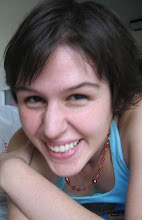
The end of the school year approaches. Mutiny is brewing among the poetry crew, and for the past few weeks I've heard countless versions of the following complaint: "Miss Sarah, we write all day at school! Why do we need to write more?" It was a question I didn't have an answer for. I always try to make class fun, but these kids were clearly exhausted by the endless work and craving something more light-hearted. So I've come up with a few new poetry games and art-writing fusions to move beyond the typical "read, discuss, write" model. This class on poetry collages was the first attempt.
I passed out ten-page packets of famous and not-so-famous poems for them to skim through. Using this raw material, they cut and pasted words, phrases, lines, and whole stanzas to create a new poem, mixing different voices in surprising new ways. Many were especially drawn to "As I Grew Older" by Langston Hughes, mixing up the lines and weaving in just a few images from elsewhere.
This week, the girls were unusually quiet and focused as they worked, and I even had time to make a collage of my own. It was a nice change to work alongside them instead of constantly circling around the room. Collages from class:
Effervescence gush It was a long time ago
I have almost forgotten my dream
And now the crickets play But it was there then
In front of me
-Saruro
some say the world will end in fire
it was a long time ago when the world exploded
that was cool
-Safia
I have almost forgotten my dream.
It was a long time ago,
a thousand lights of sun.
Only the thick wall,
Only the shadow.
My hands!
My dark hands!
Help me to shatter this darkness,
to smash this night,
to break this shadow.
And we soar up into the summer stars.
Summer. The big sky river rushes overhead.
-Dahiro
Help me to shatter this darkness
old and grey and full of sleep
bearing asteroids and mist, blind fish
old space suits with skeletons inside
I have almost forgotten my dream:
two rivers burning bright - one sap and one root -
cracked hands - half-eaten moon - thousand lights of sun
I lie down in the shadow, press an ear against its hive
-"Miss Sarah"












